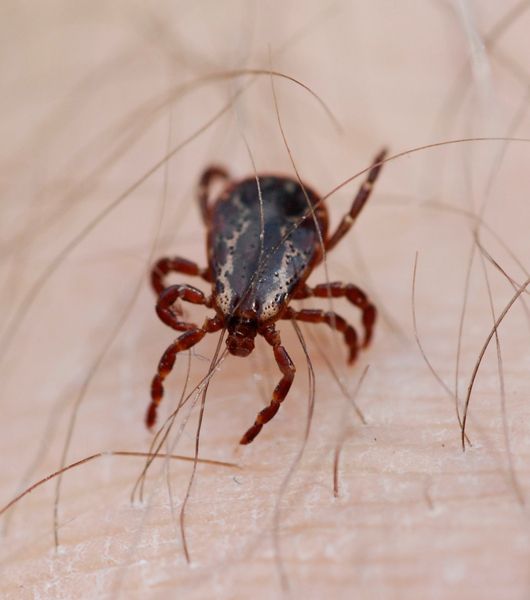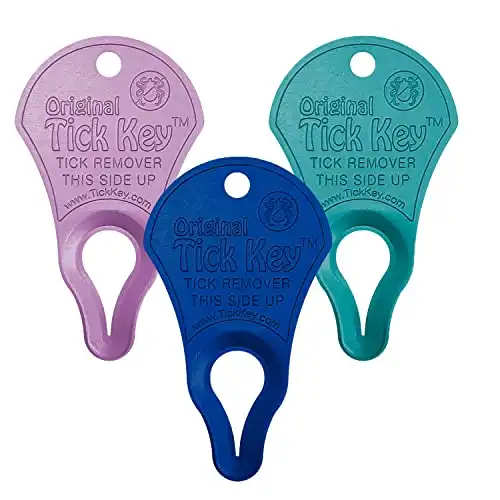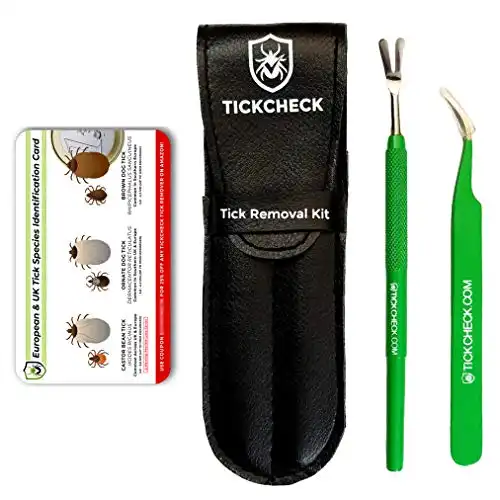There’s really nothing worse than looking in the mirror after a long day outside and seeing a tick latched onto your skin. It's happened to me before and it can be a scary and icky moment.
Ticks are parasitic arachnids (not insects!) that bite into humans and pets in order to feed on blood. I spend a fair amount of time outdoors and I’ve seen a good amount of ticks in my lifetime, and the main thing I’ve noticed about these pesky guys is that they are wildly stubborn.
If you’ve just arrived home and discovered a tick on your body, your first instinct might be to hop in the shower to wash it off.
But do ticks wash off in the shower? Can water remove a tick?
An attached tick will NOT wash off in the shower. Once a tick has embedded its head into your skin, shower pressure will not be enough and you’ll need to remove it with tweezers or a tick removal tool. Showering may however wash off any unattached ticks, and it’s also a good opportunity to properly check for any other ticks on your body.
Ticks are annoyingly persistent and there’s very little chance that showering will be enough to get rid of one once it’s bitten you.
Ticks are known to transmit several diseases and it’s important to remove one as soon as you find it to minimize your chances of any tick borne illnesses.
Does The Hot Water In The Shower (Or A Bath) Kill Ticks?

Ticks do die in hot water and washing your clothes in hot water and drying them in a dryer can in fact kill the ticks. But what about the shower or the bath?
Well according to this study all ticks are killed when water temperatures go over 130ºF/54ºC, around 50% survive when washes are between 115-130ºF/46-54ºC and 94% of ticks survive washes between 80-115ºF/27-46ºC.
The typical shower is around 105ºF/41ºC – well below the threshold for killing ticks. The average bath temperature is usually between 90-105ºF/32-41ºC.
In fact, your skin will burn with 30 seconds of exposure to water at the 130ºF/54ºC temperature required to kill ticks. Temperatures great than that can cause even worse burning with 6 seconds of 140ºF/60ºC water causing burns and just 2 seconds of 150ºF/65ºC water causing third degree burns.
Therefore, hot water in the shower or the bath will not kill ticks.
The shower can however be a good way to cleanse your both after you've removed a tick the correct way and it can also be a good way to check your body for ticks after a day hiking or camping.
The sooner you notice and remove a tick the less chance you have of tick born illnesses.
Can You Drown a Tick?

It’s common knowledge that bugs don’t do well in water.
One of my earliest memories is jumping into my pool to avoid an angry bee, and it's true that most crawlers don’t like getting too wet.
This actually isn’t the case with ticks though. Although they aren’t capable of swimming, ticks can survive for multiple days underwater.
I touch on this more in this article about beach ticks (yes, you can still get ticks at the beach), but the surface tension on a tick’s waxy body when submerged actually gives it a layer of oxygen to breathe from.
This eliminates drowning as a good way to kill a tick.
It’s also important to mention that you should never try to kill a tick while it’s still attached to your body, as there’s a chance it could regurgitate blood or bacteria into the bite (gross).
If you’re a frequent hiker like me and worried about bringing ticks into your car and home, there are a number of effective ways to prevent and kill any ticks that intrude on your space.
You should also be sure to wear longer clothes when you can if you’re heading into an area where there could be ticks.
Ticks can sometimes crawl around for a while before finding a place to bite and wearing longer clothes will protect your skin (plus the dryer can be a great method of killing these nasty little things).
How Do You Remove an Attached Tick?
If you spot a tick attached to your skin, you’ll want to remove it ASAP.
Ticks are the second most common disease carrier behind mosquitos, and they transmit a number of diseases including Lyme Disease.
The easiest way to remove a tick is with a pair of fine-tipped tweezers or a special tick removal tool.
I recently came across these Tick-Removal Keys on Amazon, and if you spend most of your life outdoors like me, they might be worth the money. They’re pretty easy to carry around and they’re convenient for getting rid of a tick on the spot.
Made in the USA these tick keys use natural forward leverage to extract tick heads quickly and safely. Removes ticks of every size and kind without touching or harming them to minimize risk of infection. It works on both humans and animals.
You can also get a tick removal kit of Amazon which features a tick remover and narrow head tweezers. Which version you use is up to you.
Kit includes stainless steel tick remover for safely removing larger embedded ticks and a specially shaped super-fine-tip tweezer for removing nymphs and small deer ticks. All kept in a leather pouch with a handy tick identification card.
Once you have your tool of choice, grab the tick as close to your skin as you can (where its head is) and slowly pull the tick straight out of your skin. Make sure not to twist it as this could cause its head to break off and stay in your skin.
Once you get the tick off of your skin, you can drop it in a cup of rubbing alcohol to instantly kill it.
I’ve seen people suggest keeping the body of the tick, and I agree that this is generally a good idea as doctors can use it to backtrack any bacteria in the unfortunate case that you start to feel sick.
You should also be sure to wash your hands and the spot of the bite to further protect against any bacteria or infection.







